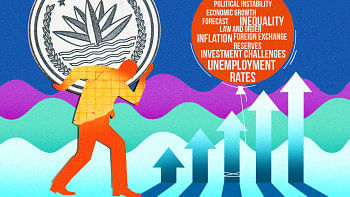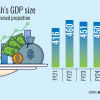Prioritise enhancing business environment

Bangladesh's economy is at a critical juncture due to widespread corruption, financial irregularities, and the politicisation of public institutions by the previous Awami League regime. Since the interim government took charge following the fall of the AL on August 5, it has been attempting to restore some stability in the financial and business sectors. However, the efforts being made are not sufficient compared to the damage inflicted on the business environment by ongoing political instability and law and order situation not being fully restored. According to Syed Ershad Ahmed, president of the American Chamber of Commerce in Bangladesh, it is imperative to improve the law and order situation in the country to recover Bangladesh's global image, which was significantly tarnished during the AL's rule. The government must also urgently address issues like political stability and corruption to rebuild the trust of international partners.
Although exports and remittances have increased over the past four months, the ongoing macroeconomic instability, high inflation, and political unrest continue to threaten economic growth and recovery. According to a recently presented government-commissioned white paper on the economy, $234 billion were siphoned out of Bangladesh between 2009 and 2023, during the AL's tenure. Economic growth has also been overstated since 1995, with the practice of inflating estimates more after the fiscal year 2012-13. Additionally, Bangladesh's net FDI was found to have been overstated by $5.7 billion between the fiscal years 2019-20 and 2022-23. These issues have significantly dampened our economic prospects, which now requires well-thought-out strategies and plans to recover.
During the reign of the AL, public institutions such as the Bangladesh Bank, the National Board of Revenue, the Election Commission, and the police were heavily politicised. This widespread politicisation has significantly affected the business climate. Moreover, as more businesspeople entered politics, they prioritised their business interests over political commitments, further politicising public institutions for personal gain. For example, according to Shushasoner Jonno Nagorik, two-thirds of the lawmakers elected in January's 12th parliamentary election were businesspeople.
Against this backdrop, the interim government must focus on bringing buyers and investors back to the country by addressing the ongoing political uncertainty and relatively fragile law and order situation. It must implement significant reforms in state institutions to rebuild trust with international partners. Furthermore, it should encourage the creation of new businesses to attract both foreign and local investors. Since business and commerce depends on political stability and the overall situation in relation to law and order, the challenges faced by businesspeople in these regards must be urgently addressed.


 For all latest news, follow The Daily Star's Google News channel.
For all latest news, follow The Daily Star's Google News channel. 









Comments